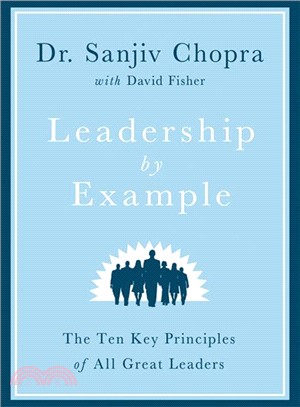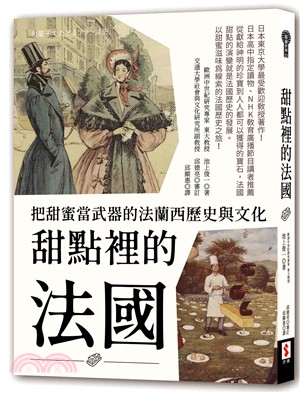商品簡介
Very few of us are leaders all the time, in everything we do, but all of us can become a leader in specific situations. In a committee, in business, at a social club or at a religious institution, we all find a time in our lives when we can lead. Few people set out knowingly to become leaders, rather they see a need and they find a way of dealing with it, and often others choose to follow their example.
Based on a talk that he has given to more than 60,000 people in at least seven countries, the “LEADERSHIP” mnemonic that Dr. C hopra explains is as follows: L - listen well. E - empathy. A - attitude. D - dreams and decisiveness. E - effectiveness. R - resilience. S - a sense of purpose. H - humility and humor. I - integrity and imagination. P - principles, and willingness to pack other people’s parachutes. Drawing from his experience as Faculty Dean for Continuing Education for Harvard Medical School as well as the writings and lives of great leaders throughout history, this easy-to-read, inspiring book will serve as a reminder and a guide to becoming leaders in our own lives.
作者簡介
DR. SANJIV CHOPRA is Professor of Medicine and Faculty Dean for Continuing Education at Harvard Medical School, and Senior Consultant in Hepatology at the Beth Israel Deaconess Medical Center in Boston, Massachusetts. He has more than one hundred publications and four specialist books to his credit. He is the editor-in-chief of the Hepatology Section of UpToDate, an electronic textbook that is subscribed to by more than 450,000 physicians worldwide. With Dr. Alan Lotvin and David Fisher, he is the author of Live Better, Live Longer. With his brother, Deepak Chopra, he is author of Brotherhood: Dharma, Destiny, and the American Dream. He has received numerous awards including the Excellence in Teaching Award from Harvard Medical School. In 2009 he was elected as a Master of the American College of Physicians. He lives in Weston, Massachusetts.
DAVID FISHER is the author of more than fifteen NEW YORK TIMES bestsellers. He lives in New York.
名人/編輯推薦
--Charles R. Denham, Sr Fellow, Harvard Advanced Leadership Initiative; Chairman, TMIT
“In all my years in academic medicine, the most important lecture I have ever had the pleasure of attending was 'The 10 Tenets of Leadership' by Professor Sanjiv Chopra. Now available in hard copy, it is a ‘must read’ that illustrates how we all can be leaders in our own areas of endeavor thereby making the world a much better place.”
--Melvin E. Clouse, MD, Deaconess Professor of Radiology, Harvard Medical School
書摘/試閱
Dr. James O'Toole, the Daniels Distinguished Chair of Business Ethics at the University of Denver's Daniels College of Business and the bestselling author of eighteen books, has become well known for his work in understanding corporate culture and the traits of leadership. "The true leader is a listener," he wrote. "The leader listens to the ideas, needs, aspirations and wishes of the followers and then within the context of his or her own well developed system of beliefs responds to these in the appropriate fashion."
Leadership begins with listening. In order to move forward you have to know where you are beginning, and that requires the ability to listen. Not just hear, but really listen. For many people that is not an easy thing to do. They are so excited about expressing their own thoughts and ideas that they don't take the time to actually listen to what other people are saying.
It probably won't surprise anyone to learn that the number-one source of quotes is the Bible, the second most quoted source is the Bard, William Shakespeare. And the third may well be Mr. or Mrs. Anonymous. There is a wonderful Turkish proverb that reminds us to "Listen a hundred times, ponder a thousand times-speak once."
A former major league baseball player and scout named John Young grew up in the decaying section of Los Angeles known as South Central. That neighborhood had once sent a stream of African-American athletes to the major leagues, but by the early 1980s that flow had stopped. Young wondered why and started speaking to members of the community. He listened carefully to their answers. He was told that kids in that area between the ages of thirteen and sixteen quit playing baseball because after Little League there were no organized programs for them. This caused them to turn to other sports-but also to drugs and gangs. As Young learned, the same thing was happening in inner cities throughout the United States. So with little money and few resources, Young founded a program that he named RBI, Reviving Baseball in Inner Cities. From coast to coast volunteers began building baseball fields in vacant lots. Eventually major league baseball got excited about the concept and became a primary sponsor of the program. Today, in 200 American cities more than 200,000 boys and girls are participating in RBI programs. While Young used the lure of baseball to bring kids into RBI he expanded beyond the fields of dreams to include year-round educational programs, peer mentoring, and even vocational training. John Young had no special organizational skills when he founded RBI, but he recognized a problem in his community, asked questions and listened carefully to the answers, and then set out to build a program that would teach kids the skills they needed to succeed in baseball and, much more important, in life.
Leadership absolutely requires a respectful exchange of information, and that means listening as well as talking. The legendary corporate executive Lee Iacocca, who created some of the most successful models in automotive history while at Ford and then transformed Chrysler, which was on the edge of bankruptcy, into an industry leader, once lamented, "I only wish I could find an institute that teaches people how to listen. Business people need to listen at least as much as they need to talk."
The legendary physician and author Oliver Wendell Holmes Sr. was known as one of the most provocative public speakers in the nation, but even he appreciated the importance of listening, reminding people that "It is in the province of knowledge to speak, and it is the privilege of wisdom to listen." And it was Abraham Lincoln who gave us a very important reason to simply stop talking and listen, pointing out, "It is better to be silent and be thought a fool than to speak up and dispel all doubt."
He gave me three pieces of advice when I became provost: "Listen, listen and listen."
-Susan Hockfield, president of MIT, on Richard Levin, president of Yale University
Ironically, listening is a skill that often has to be learned and practiced. And for some people, that's difficult. In fact, the actress and playwright Anna Deavere Smith was hired by Yale University to teach its medical students and by New York University to teach its law students the art of listening. As she told them, "Listening is not just hearing what someone tells you word for word. You have to listen with a heart. It is very hard work."
In his acceptance speech in November 2008, the newly elected president, Barack Obama, told a huge crowd that "I will listen to you-especially when we disagree." And later he added, "As Lincoln said in his first inaugural address, to a nation far more divided than ours, 'We are not enemies but friends. Though passion may have strained, it must not break our bonds of affection.' And to those Americans whose support I have yet to earn, I may not have won your vote tonight, but I hear your voices. I need your help."
The president of Yale University, Richard Levin, has become renowned for his ability to nurture academic leaders. When his provost, Susan Hockfield, was appointed president of MIT, she admitted, "He gave me three pieces of advice when I became provost: 'Listen, listen and listen.'" And Levin himself said, "Listening is the first rule of managing."
When we talk about listening as the key to leadership, clearly we mean more than the spoken word. Jack Welch earned a reputation as General Electric's chairman as one of America's most innovative and effective leaders, and he was particularly vocal about listening to new ideas. He wondered why some executives would spend a considerable amount of effort and money to assemble a great workforce-and then refuse to listen to those same people. He believed that the best thing he could do was listen with respect to those people he had hired. In fact, he created a culture at GE where people were rewarded for thinking outside the box and coming up with innovative ideas. And even when an idea failed, even if it cost the company millions of dollars, he still rewarded those people. When asked about that he said, "It is a badge of honor to get good ideas from someone else."
主題書展
更多書展本週66折
您曾經瀏覽過的商品
購物須知
外文書商品之書封,為出版社提供之樣本。實際出貨商品,以出版社所提供之現有版本為主。部份書籍,因出版社供應狀況特殊,匯率將依實際狀況做調整。
無庫存之商品,在您完成訂單程序之後,將以空運的方式為你下單調貨。為了縮短等待的時間,建議您將外文書與其他商品分開下單,以獲得最快的取貨速度,平均調貨時間為1~2個月。
為了保護您的權益,「三民網路書店」提供會員七日商品鑑賞期(收到商品為起始日)。
若要辦理退貨,請在商品鑑賞期內寄回,且商品必須是全新狀態與完整包裝(商品、附件、發票、隨貨贈品等)否則恕不接受退貨。























